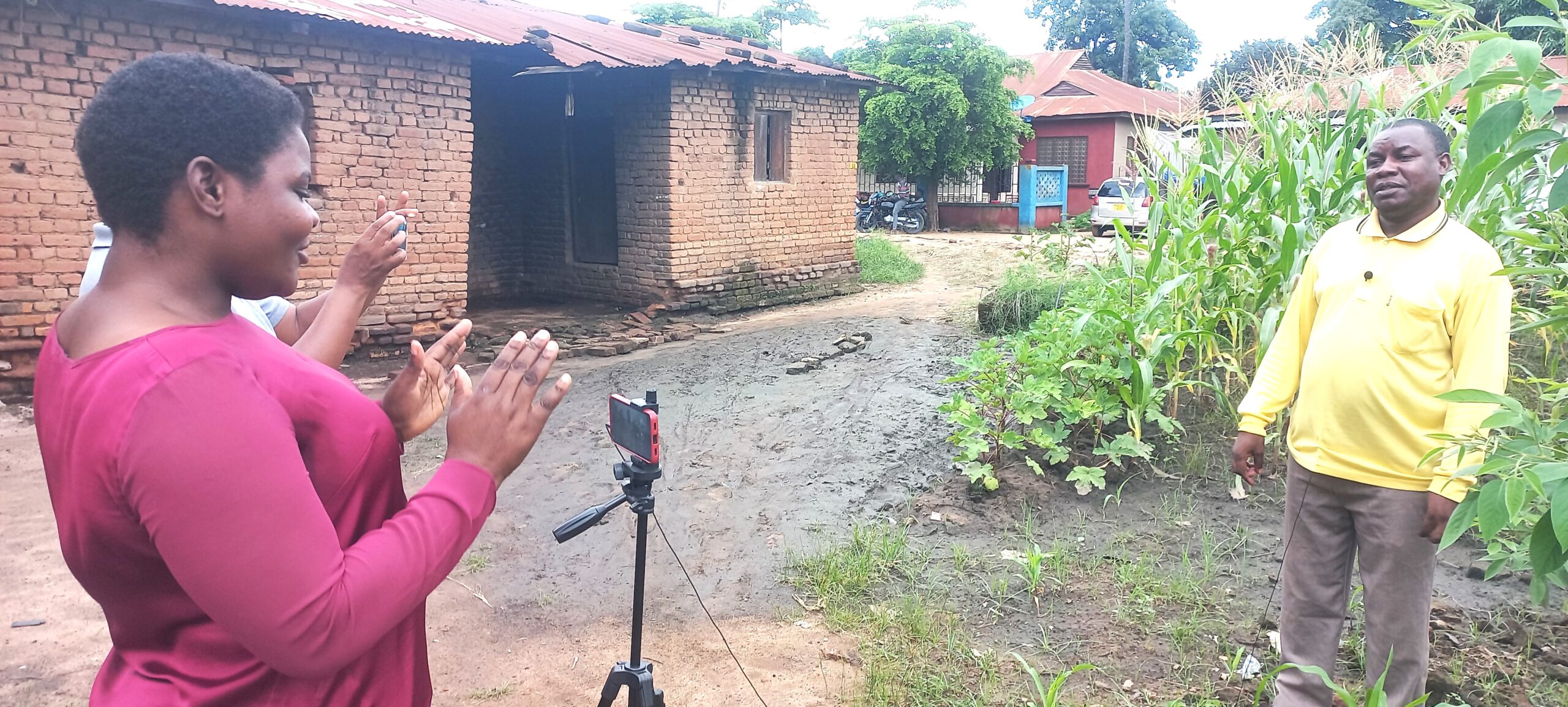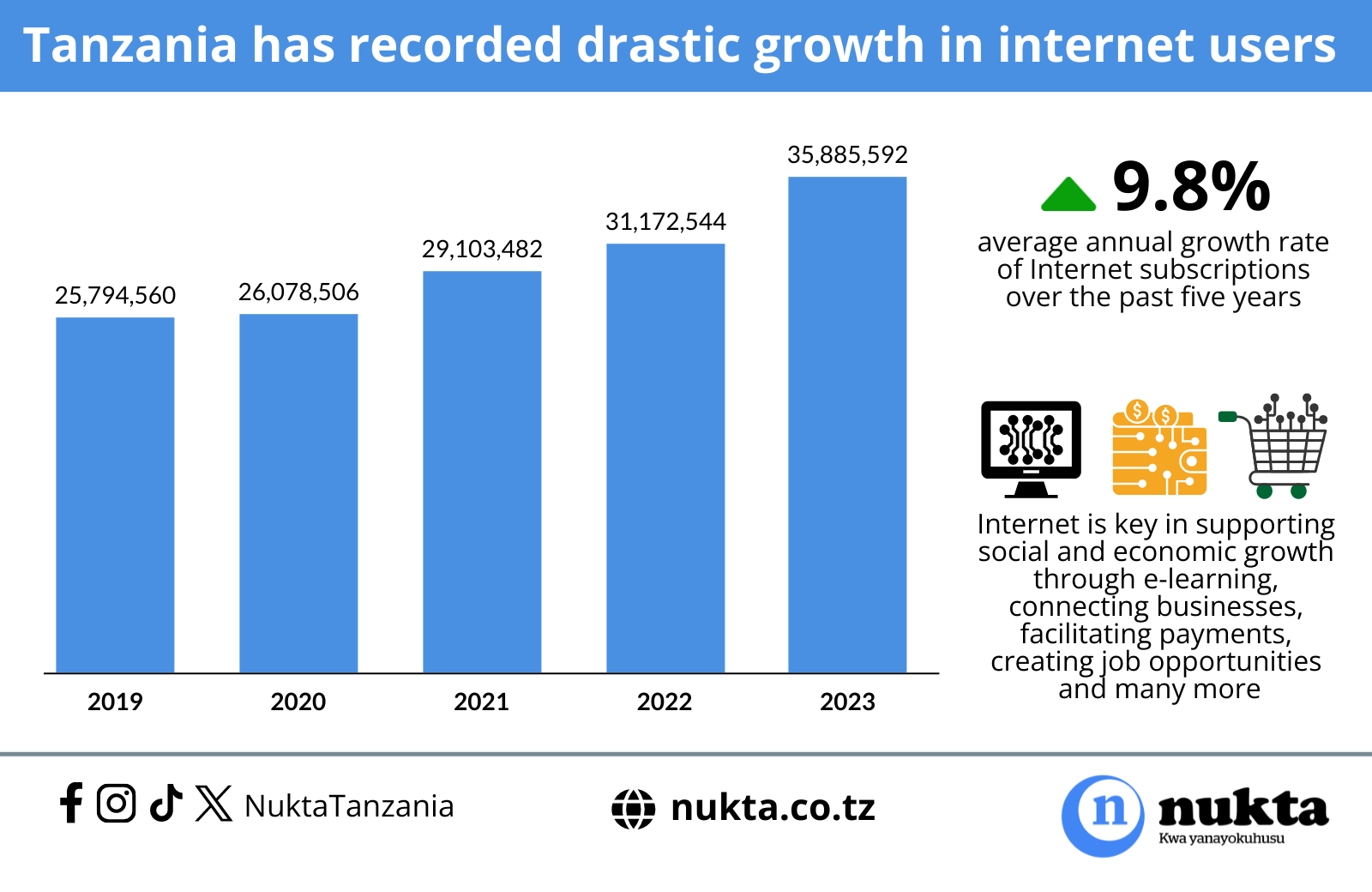Digital connectivity is key to social, economic transformation in Tanzania
 Share
Share
 Tweet
Tweet
 Copy Link
Copy Link
Nearly 20 years ago, owning a mobile phone was a luxury in Tanzania. Very few people had mobile phones. As you might guess, these were people from the middle and upper classes. In total, according to Tanzania Communications Regulatory Authority (TCRA) data, there were 2.1 million telecom subscribers in 2004 and 93 percent were mobile subscribers.
For youth, very few had mobile phones, thanks to their rich parents or guardians. I remember when we were in high school in Ndanda, Mtwara where few students had mobile phones. By that time early 2007, even some teachers and other school workers did not have phones. Phones were highly coveted among students.
To connect with our loved ones who were blessed to have phones, we had to book our slots to friends two days before and most of the time you will get late evening calls. In our dormitory for example, only one person had a Siemens C25 with 16 buttons, if I remember quite well. Communicating with my phone was a cash draining affair. When you call you pay and when you receive you pay.
Despite such a large ownership gap, most of us learned so much about connectivity through friends’ phones. I did not have one when I joined high school because in our village no one was selling those “weird gadgets” and I am not sure about purchasing power.
But through exposure to mobile phones from different friends, I was motivated and bought one at the end of the semester of form five. One of the “rich kid” misused his pocket money and he was selling a phone to get cash for survival. I had some money and bought a small Siemens phone with a curved shape and blue display—what a “rich” village boy.

Journalists from Pambazuko FM in Ifakara, Morogoro practicing mobile journalism in April 2024 as part of the biodiversity conservation and digital transformation training and mentorship project by Nukta Africa funded by USAID through Tuhifadhi Maliasili Project. Digital technology is transforming the media industry by providing new business opportunities and risks. Photo|Nuzulack Dausen/Nukta Africa.
Digital skills sharing is the future
With time and technological changes many students learned to use the internet on phones from a few people who had advanced mobile phones with General packet radio service (GPRS). Our phones by that time would connect to WAP micro browsers to access content sites such as Waptrick and read books online.
We learned how to download digital books and play music on the phone. We learned KBs from there despite having zero ICT knowledge. At the time we were graduating high school nearly half of our dormitory had mobile phones. They saved every penny to buy a phone. We wanted to communicate and get more features from phones-connectivity. We wanted to be seen as educated and going with trends. Those days a mobile phone was a symbol of wealth.
This learning habit moved from mobile phone to computer usage. Most of us learned computers from friends or internet café. We learned that you can apply to college, scholarship or job opportunities online through an internet café. From those borrowed or rented computers, some gained more knowledge and skills to the level they have employed themselves in the informal sector.
I was among these people who learned to do basic computer maintenance through informal channels after receiving a used computer as a gift from my high school friend, Raymond Majengo who is currently a data specialist in one of the international organisations in Tanzania. They had used desktops in their store and he convinced his family to give me one while we were in form five. We can still donate more used computers today to fast track digital adoption especially in rural areas.
Technology adoption starts with an individual
Back to my story, my computer was the first in our village owned by an individual. To power it I needed a generator and many neighbours would surround me down the tree to see a blue monitor blinking with numbers, of course, they thought it was a TV screen. It was not. Many wanted to learn how to operate it. It was something new. Through the computer I was gifted by Raymond two or so friends were attracted to take a computer course.
I learned how to connect and fix software and hardware through my first computer, thanks to my prior interests and skills in electronics. I have earned income by using computers and smartphones through learning from friends. Today I do complex data analysis, and computers and smartphones are not only devices but a key determinant of my income and destiny of my career.
I have narrated this story to show how a nation can leverage technology through formal and informal systems such as sharing digital devices and skills to achieve desired social and economic growth. To achieve this, we need to invest both in infrastructure, devices and awareness on how to use these digital technologies for prosperity.
This is because today connectivity is no longer a luxury and a symbol of wealth anymore, it is life. Through a mobile phone a farmer can get information through the internet or a radio about weather changes, he can send or receive money related to his farming activities and he can market his produce.
This was not possible before thanks to serious investment from telecom companies and improving business environment. Internet usage, which has recorded a tremendous growth in the last decade in Tanzania, is becoming a basic need at home and office connecting millions of businesses. I know some colleagues who struggle to balance their basic necessities and internet expenses. A day without the internet is boring and a loss.
 Why should telecoms care?
Why should telecoms care?
In today’s world telecom companies should view users of their services such as voice, SMS, data or mobile money as partners instead of mere customers. For them to sell more data and achieve technological milestones they need many users to have smart devices and income that is capable of subscribing to the designed services.
The service they offer now is important like food. We don’t eat, we die. Yes. Today the internet is highly used in hospitals, in courts and in schools. An interrupted internet service during a telemedicine-driven surgery is highly likely to affect the life of the patient.
Under such circumstances, telecom should innovate services that cater for everyone according to income, education and locality. They should find the best mechanisms to compensate customers when their services are interrupted. I have seen some telecoms doing this, including Vodacom Tanzania.
According to Andrew Lupembe, Vodacom Tanzania Network Director, the company refunded its users following the two-day network crisis in mid-May this year and that they are exploring solutions to ensure such outages will never happen again. This move announced by Lupembe during the Voda Chat early July is recommendable and more companies should embrace it.
Even as telecoms expand their network and services, it is important for them to innovate more solutions that empower everyone in our communities such as the one of providing smartphones under loan arrangements. They need to expand their network in remote areas to bridge the digital divide despite the fact that these rural initiatives have lower returns. They can achieve this in partnership with Universal Communications Service Access Fund (UCSAF) because it is a long term investment.
They need to innovate new technologies that will lower connectivity costs and implement strategies that will lead to mass adoption of digital technologies formally and informally as I narrated early in this article. Let all know that digital connectivity is a catalyst of social, political and economic development.
Nuzulack Dausen is the CEO of Nukta Africa, a digital media and technology company specialised in research of emerging journalism and communication practices, media training and production of digital and data-driven content. He is a senior journalist specialising in covering business, economics, technology and data. These are his own views and may not necessary reflect with Nukta Habari position.
Latest




